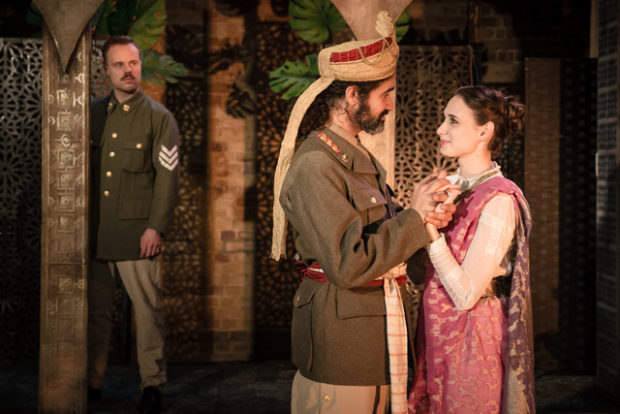You have no items in your cart. Want to get some nice things?
Go shopping
Entering the Union Theatre for a production of Othello, one would hardly expect to be welcomed by the inebriating scent of incense, to find an Indian-looking porch on stage, and to hear the quiet notes of a piano in the background. Directed by Phil Willmott, the Shakespearean classic is set in the Punjab region during the British occupation and the start of Indian revolutionary non-cooperation. This is to mark the centenary of the Jallianwala Bagh massacre, where both Indian and British officers fired into a large gathering of unarmed locals during the Sikh feast of Vaisakhi.
Setting Othello in early 20th century India is a radical choice, and one that brings with it a number of risks. Willmott says he was “interested in the cultural and social rifts that produce the play’s two ruthless killers (Othello and Iago)”. If anything, the production deserves to be praised for its boldness, even when the actual execution is not entirely convincing. Throughout the play, the historical backdrop isn’t necessarily all that prominent (or clear): there are only handful of scenes centred around historical facts, which makes the political atmosphere of the time seem irrelevant, or confused. Even the root of Iago’s own resent, which is put down to his inability to climb the military ranks as an English orderly, while the Indian officer recruit Othello is fast-tracked to the rank of General, is questionable and not entirely fitting. In spite of this, the play does manage to stand on its own two feet anyway, proving powerful predominantly in the way the personal (rather than political or historical) dynamics are spanned out.
In Willmott’s production, the focal point seems to be not so much Othello, but Iago. Admittedly, even from a plot perspective, Iago can be seen as the centre of the intricate web of lies and manipulation he himself conjures up – it is he who ultimately drives Othello to his renowned jealousy. Rikki Lawton takes his role one step further, becoming the real, scene-stealing, pivoting force of the action, with an excellent rendition of his complex character. This is also fleshed out brilliantly towards the end, in a masterfully directed scene with no lights on stage. Iago alone is brandishing a torch, illuminating the rest of the cast as they speak and move, creating sublimely orchestrated tension. That very sequence, I felt, is the visual representation of his “charismatic malevolence” – he is physically in control of what others (including the audience) can and cannot see, and his own version of reality becomes the one and only side of it there is.
Anything would shine less bright in the presence of Lawton’s formidable rendition, but Matthew Wade as Othello comes across as slightly less strong, and less convincing in his escalation from doubt to suspect, all the way to insanity, which seems to develop rather haltingly. At the very end, though, he redeems himself by delivering his final lines with outstanding pathos. Desdemona (Carlotta De Gregori) and Emilia (Claire Lloyd) also offer good performances, though commendable primarily for making the iambic pentameter rhythm sound natural enough. With an overall good spoken performance, what could be improved are the cast’s movements on stage, which are at times stiff, unnatural, forced (culminating in the cringeworthy sequence of Desdemona’s death). On the other hand, all the actors manage to make the most of the terrific set design by Justin Williams and Jonny Rust, coming in and out of the porch, adding on to the allusivity of the play: what we can see is not always what actually is. Thus the play walks on a tightrope between giving Shakespeare a genuine dynamic twist and failing on a few very basics.
Largely, the play has the power to shine a new light on the relevance of Othello. The notion of reputation, which goes right back to Achilles’ concern with kleos in Homer’s Iliad, strikes as hugely applicable to our time, where the worry of what people think of us (and what they can see on our social media) is a constant concern. There’s also the idea of the parallel worlds we create for ourselves by believing in half-truths (or fake news). In the Othello more than anywhere else, we see clearly how unfounded, abstract and imaginary thoughts can lead to tangible and tragic consequences in the real world. And finally, the idea of honesty, or perceived honesty, is central to the play and we should be more mindful of it too, in a world where double standards seem to be the norm.
There’s much to be appreciated in this Othello: its multi-sensory appeal, its intense interpretations, its gorgeous set design – overall, it is an adaptation worth seeing, perhaps not so much for its historical rigour, but for the timeless possibilities Shakespeare is able to offer.
About Anna Zanetti
Anna graduated from the University of Oxford with a BA (Hons) in Classics, specialising in Literature, Aesthetics and Ancient Art. Currently based in London, she has eclectic interests, including avant-garde art, cycling, reading, contemporary dance, opera, (watching) rugby, and anything to do with Latin. She writes for The Oxford Culture Review, Theatre Bubble and A Younger Theatre, as well as keeping a personal blog about arts and culture.
- Web |
- More Posts(10)




